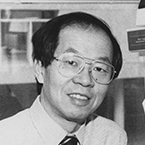
Frederick P. Li, MD, professor emeritus of clinical cancer epidemiology, Harvard School of Public Health; professor emeritus of medicine, Dana-Farber Cancer Institute; and fellow of the AACR Academy, died June 12, 2015. Li is recognized as one of the founders of the field of cancer genetics and one of the physicians who first identified Li-Fraumeni syndrome.
Li was an active member of the AACR since he first joined in 1975, serving as editor-in-chief of Cancer Epidemiology, Biomarkers & Prevention (1997-2002) and as a member of the board of directors (1995-1998). In addition, he served as an assistant editor of Cancer Research (1990-1995) and co-chair of a joint meeting with the International Agency for Research on Cancer, “Interactions of Cancer Susceptibility Genes and Environmental Carcinogens.
“Dr. Li was a pioneer of the fields of genetic and molecular epidemiology, which have taught us that about 5 percent of all cancers diagnosed in the United States are strongly hereditary,” said Margaret Foti, PhD, MD (hc), chief executive officer of the AACR. “His groundbreaking research inspired the work of a whole generation of epidemiologists, which in addition to his own personal contributions, allows men, women, and children to take action to prevent cancer or to detect cancer early, at a stage when it is more likely to be successfully treated.
An expert in the genetic changes that result in loss of normal cellular control mechanisms, Li began his epidemiological study of cancer arising from inherited susceptibility genes while at the National Institutes of Health. At the time, most familial aggregations observed were to cancers of the same type. Li expanded upon these findings when he identified families who experienced a constellation of cancers affecting both children and young adults, most notably rhabdomyosarcoma and breast cancer, among others. It was this research, coupled with similar concordant studies conducted by Joseph Fraumeni, MD, which led to the identification of Li-Fraumeni syndrome (LFS).
When Li began his work, the science of molecular genetics was not yet in the mainstream of cancer research, and familial tendencies to disease were often thought to be attributed to environmental factors, viruses, or chance. Over the years, Li sought a mechanism to explain LFS, but success was limited until new genetic technologies were developed allowing for the eventual characterization of LFS as an autosomal-dominant disorder, linked to germline p53 mutations. LFS was also found to significantly increase a patient’s susceptibility to cancer. This discovery has since resulted in countless studies devoted to identifying and characterizing additional cancer susceptibility genes.
Li’s pursuit to develop cancer prevention strategies in high-risk populations has revolutionized the fields of genetic and molecular epidemiology. To this day, his contributions to cancer research continue to set the standard for cancer etiology and prevention studies.
Born May 7, 1940, in Guangzhou, China, Li immigrated to the United States at age 7 with his family. He graduated from New York University, then received his medical degree from the University of Rochester School of Medicine and Dentistry in Rochester, New York.
Li was honored with numerous accolades throughout his career, including the AACR-Richard and Hinda Rosenthal Award, the Charles S. Mott Prize from the General Motors Cancer Research Foundation, the AACR-American Cancer Society (ACS) Award for Research Excellence in Cancer Epidemiology and Prevention, the ACS Harry and Elsa Jiler Clinical Research Professorship, the ACS Medal of Honor for Clinical Research, and the Maurice and Charmaine Kaplan Distinguished Lectureship. He was also appointed to the National Cancer Advisory Board by President Bill Clinton in 1996.
Li is survived by his wife, Elaine Shiang, three children, and two grandchildren.
Be the first to add a Remembrance.